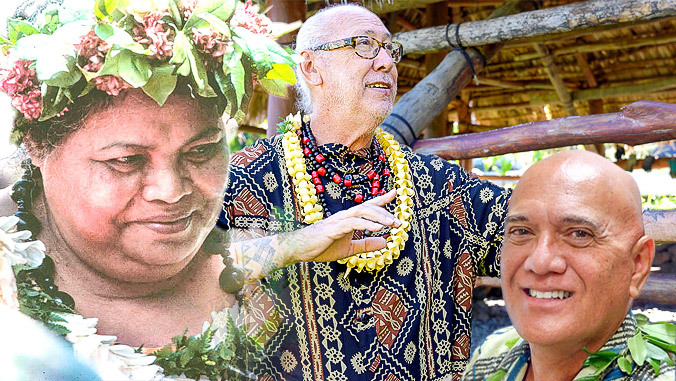
Three Native Hawaiian luminaries were recognized for their contributions toward the preservation and revitalization of the Hawaiian language and culture. Edith Kekuhikuhipuʻuoneonāaliʻiōkohala Kenao Kanakaʻole, Frank Kawaikapuokalani Hewett and Jerald Kimo Alama Keaulana were each awarded an Honorary Doctorate of Humane Letters at the April 20, 2023 meeting of the University of Hawaiʻi Board of Regents.
Edith Kanakaʻole
Legendary kumu hula and composer Edith Kanakaʻole (1913–79) worked as a teacher at Hawaiʻi Community College from 1971 to 1974 and at UH Hilo from 1974 to 1979. At both schools, she created courses and seminars on subjects including Hawaiian language, ethnobotany, Polynesian history, genealogy and Hawaiian chant and mythology.
The recommendation letter stated: “Aunty Edith was a kumu hula, a master instructor for hula and an academic researcher developing her own chants for cultural preservation and academic work. Her contributions extend to the work of environmental scientists and Hawaiian universities that teach her philosophies and scientific methods and position Hawaiʻi, and the United States, in the global conversation on climate resilience.”
In March 2023, a commemorative quarter honoring Kanakaʻole was released into circulation by the U.S. Mint. She is one of five American women to be minted on new quarters as part of the 2023 honorees for the American Women Quarters™ Program.
Kanakaʻole’s family will accept the degree and be recognized at the UH Hilo and Hawaiʻi CC spring commencement exercises. The community is invited to celebrate Kanakaʻole’s life and legacy, on Saturday, May 6, 2023 at UH Hilo.
Frank Kawaikapuokalani Hewett
An accomplished kumu hula, award-winning composer and singer, Frank Hewett is an advocate for the culture and arts of Hawaiʻi as well as an author, researcher and practitioner of Hawaiian medicine. While Hewett shares his wealth of knowledge with students as a Hawaiian studies lecturer at Windward CC, the recognition was proposed based on his numerous lifetime achievements.
The recommendation letter stated: “While teaching for the University of Hawaiʻi, Kawaikapu was still largely involved in promoting Hawaiian cultural traditions and values within the broader community. Not only was he a performing musician and hula dancer, but he also continued to work within the community to teach hula, culture, and the healing traditions that were taught to him by [Kahuna Emma] DeFries.”
As a member of the Hawaiʻi Academy of Recording Arts, Hewett has won numerous Nā Hōkū Hanohano awards as a composer and performer. He started his hālau in 1978 and continues to teach hula to students from around the world. Hewett is currently directing a project to document the learning experiences, teaching methods and upbringing of kumu hula who are considered kūpuna to preserve that knowledge for future generations.
Jerald Kimo Alama Keaulana
Jerald Keaulana has numerous accomplishments as a historian, musician, composer, kumu hula, educator, author, researcher, advisor, community leader and advocate. The Bishop Museum Kimo Alama Keaulana Mele Collection was named after him when he committed more than 1,000 mele to their archives.
The recommendation letter stated: “Within the UH Mānoa Kumu Keaulana has taught students, including our own faculty. Ka Waihona A Ke Aloha is a multi-media mele repository and interactive resource within the Kawaihuelani Center for Hawaiian Language. It houses more than 600 mele from summer courses he taught, including video footage of him teaching melody to students conveying much treasured meaning and intent. This institute is celebrating 20 years of mele stewardship at the university this 2023 and will be celebrating 20 years of working with Kumu Keaulana. He embodies the university’s education mission as his teachings and guidance have inspired generations of Native Hawaiians throughout Hawaiʻi and the world.”
One of the letters of support stated: “Uncle Kimo continues to encourage others around him to realize their own potential and ability to promote the Hawaiian culture with integrity. He inspires countless people of all ages as a role model, choosing to remain in alignment with our Kūpuna in caring for their knowledge and using it to reach our cultural understanding. The etiquette and mannerisms he displays as a chosen guardian of ancient knowledge provides a sound template for others to clearly demarcate boundaries of conduct for when—and when not to invoke forms of artistic or creative licenses, lest we ignore ancient wisdom and lean on our own when convenient.”
More on honorary degrees
The UH Board of Regents may confer honorary degrees to individuals who are “distinguished with the equivalent of a national or international reputation. Scholarship, the arts, public service, the professions and business and industry are examples of general areas in which distinguished accomplishments may warrant the award of an honorary degree by the university.”

